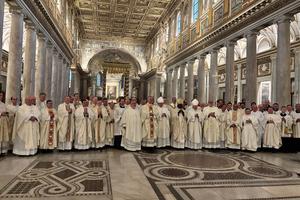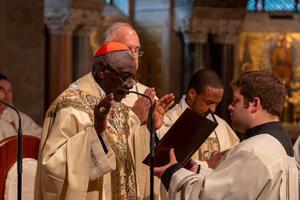Cardinal Napier: Next Year’s Synod Will Feature ‘Truth, Fidelity and Authenticity’
The South-African cardinal has been appointed as one of the presidents of the synod on the family.

VATICAN CITY — Last month, Pope Francis appointed South African Cardinal Wilfrid Napier, the archbishop of Durban, as one of the presidents of next year’s synod on the family. His appointment was viewed as part of a push to have more African bishops represented in key leadership positions and immediately preceded the Pope’s appointment of Guinean Cardinal Robert Sarah as prefect of the Congregation for Divine Worship and the Discipline of the Sacraments.
Cardinal Napier was one of the most high-profile and outspoken critics of some aspects of the recent extraordinary synod on the family. In this Dec. 23 email interview with the Register’s Rome correspondent, Edward Pentin, he discusses why he chose to speak out, his hopes for the next synod and what African Catholicism has to offer the universal Church.
Pope Francis recently appointed you as one of the presidents of next year’s synod. What do you hope to bring to the role, especially with regards to a perspective from Africa?
My understanding is that when the Holy Father appoints a person to a key leadership position, it is primarily because he is committed to giving collegiality a real expression in the Church of today. Therefore, in appointing someone from Africa, it is to give the Church in Africa a real voice at the universal Church level. Second, it is because he, or those who are close to him, have become aware of the person’s ability to contribute to the task at hand.
Cardinal Sarah was recently appointed prefect of the Congregation for Divine Worship. Do you foresee more Africans gaining important roles during this pontificate, and if so, why?
Cardinal Robert Sarah has years of experience in office in Rome, first at Propaganda Fidei and then at Cor Unum. Both offices give him a wide vision of the Church in Africa, but also in other parts of the world.
Giving him a leadership role in the Congregation for Divine Worship is an acknowledgement of this, plus the fact that Africa has for years been celebrating the liturgy with its own particular flavor and flair, a living expression of faith and feeling at home with God.
What can the African Church offer in particular to the Church in the West, and how important is it that the West heeds what the African Church has to offer?
The first thing of note about the Church in Africa is that it is a Church made up of people who know and acknowledge that they need God. Because of that, God has a real and living place in their lives. Secondly, the Church in Africa is much more committed to living the faith than to arguing or debating about it. I believe the Church in the West could benefit from putting faith in God, especially the sacrifices that are implicit in that faith, before and above niceties of explanations of doctrines, etc.
You were one of the most outspoken critics of how the recent synod was run. What disturbed you most about the proceedings and any developments since then?
When I spoke at the media briefing and criticized elements of the synod proceedings, I was by and large reflecting the views of our circulus minor [small working group of synod bishops]. To a lesser extent, I was expressing the concerns of the Church in Africa; and, third, I was raising my own disquiet, because I knew from experience how media distortions could and would spread confusion and even damage the Church’s clear teaching and practice as a long-standing exponent of what Jesus, the apostles, the [Church] Fathers and the magisterium had taught and lived down the ages.
Of particular concern was the dressing up in overly positive terms the irregular situations, such as cohabitation, divorce and remarriage, single-parent families by choice and same-sex relationships. When you are holding up the bar of moral uprightness, you cannot at the same time sing the praise of the contrary.
How confident are you that the process for the next synod will be more fair and more open, allowing all points of view to be aired and taken forward?
I am confident that both the secretariat of the synod, its council and those attending the synod session will have learned the need to give clear teaching by distinguishing it from possible or speculative thinking and proposals.
I am also fairly sure that bishops’ conference representatives, as well as individual bishops, will be much more aware of what their people think, feel and want the Church to do and say.
With all the prayers that will be offered for the synod, I feel certain that the Holy Spirit will enlighten and guide the Church along the way of truth, fidelity and authenticity.
- Keywords:
- cardinal robert sarah
- cardinal wilfred napier
- communion
- edward pentin
- family
- marriage
- national catholici register
- pope francis
- synod_2o15
- synod_2ol4
- vatican city


















